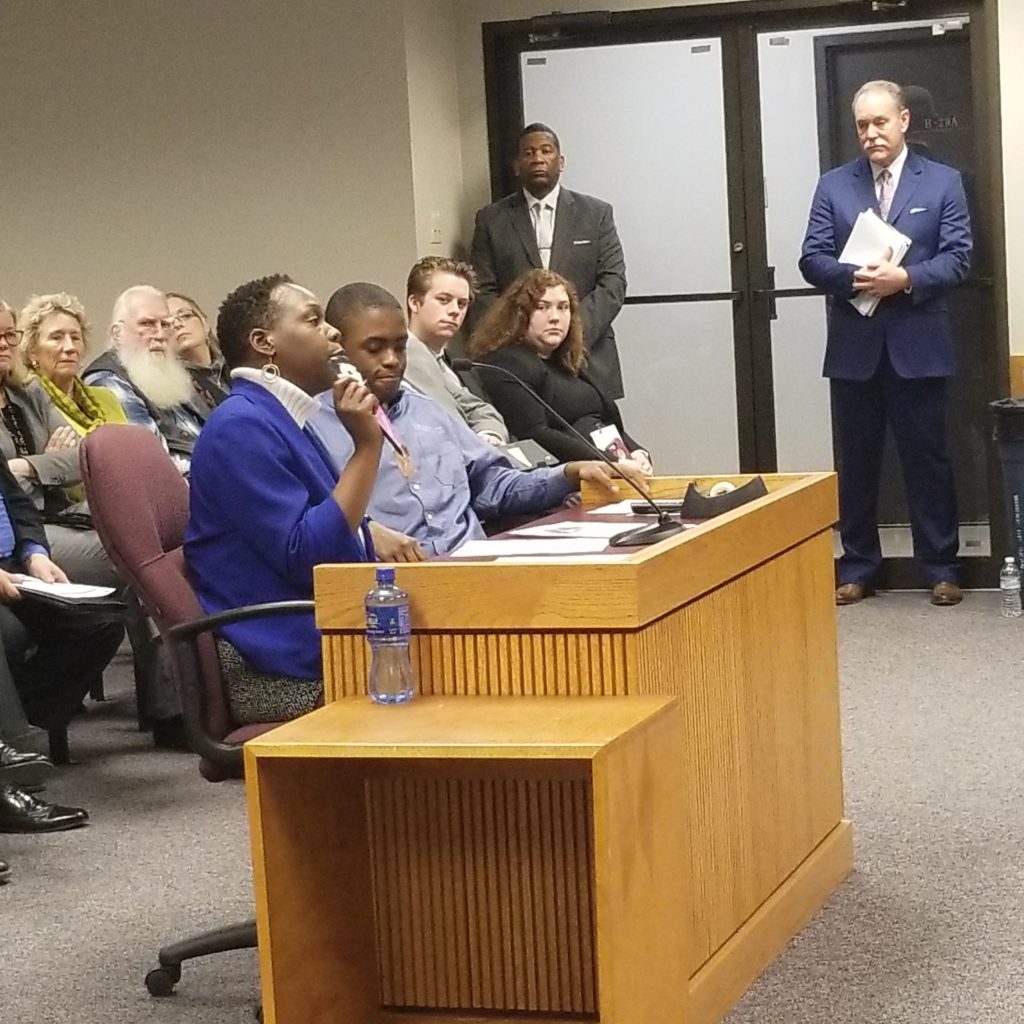Missouri asks for access to charter schools

On Tuesday, people from almost every demographic and sector spoke before the Missouri House Education Committee with one clear message: “Help more Missourians have access to charter schools!”
The hearing focused on HB581 which would increase acountablity for charter schools, allow charter schools to open in almost every metropolitan area in the state, and make it easier for charter schools to find buildings to operate in.
Robbyn Wahby, of the Missouri Charter Public Schools Commission and Doug Thaman, of the Missouri Charter Public Schools Association, set the stage for the testimony, talking about the need for greater access to quality schools and the importance of having high standards for charter schools.
Wahby said her organization set an exceptionally high bar for any charter schools it sponsors.
“We have rejected more applications than we have approved,” she told the committee. “It is not uncommon for a potential school to take years honing their application.”
Thaman said that accountability was important because every child in the state deserves to go to a high quality school, adding that many families are already able to achieve that by moving to a particular district or making sacrifices to pay to send their children to private school.
“If a school is failing their students, most Missourians would not force their kids to go to it just because the school needs money,” he said, adding that sadly many families find themselves trapped in just such a situation because of where they live and their financial constraints. “Where parents can afford to make choices we should be glad, but where they cannot afford the choices we should help.”
Kim Townsend, a parent and educator who lives in the Hazelwood School District, said she knew many people in her community in just such a situation.
“Parents who live outside of the city of St. Louis, we do not have other options other than the school assigned to us,” she said. After looking at the quality of schools in her area she is considering starting a charter school and meeting with other parents in the area. “It became increasingly clear that there is a demand in my community for more public options. Parents are really hungry and desperate for another option. They are really worried about whether their child will be physically safe, emotionally safe and really able to thrive in the schools. People are excited about the posibility of there being another option.”
Two charter school parents, Carmen Ward and Ryan Tucker, told the committee what a difference charter schools had made in their children’s lives.
Ward said that her autistic son had struggled in both district and private schools until they found KIPP charter schools.
“They found things in my son that I did not know was there that he did not even know was there,” she said, adding that the school had almost become a second family.
She said she was lucky because she had options, both financially and because of where she lived.
“If I choose to, I can put him in SLPS, put him in a magnate, leave him in a charter or pay for private,” she said. “I am 1.5 miles away from the lowest performing schools in the area. Those other kids, they have no choices.”
She told the committee they had a responsibility to make sure those children had access to a good education.
“You can choose to
Ryan Tucker, a parent with two children at Gateway Science Academy, said he too had chosen a charter school for his children after having difficulties with traditional district schools.
He said he loved the school his children currently attend.
“As a parent, I see the values that GSA tries to teach my kids of time management, planning, accountability, self-discipline and a feeling of independence,” said Tucker.
Bill Kent, president
“We should not force students to fit into a school simply because they live in a certain community,” he said. “All parents deserve to have a school that fits their child.”
Marcus Robinson, with The Opportunity Trust, agreed,
I believe in urban education,” he said, adding that the proposed legislation is a good mix of expansion and accountability. “The accountability measures in this bill send a strong message that the legislature cares not just about innovation. They draw a sharp and crisp line around how long we are going to operate underperforming schools.”
Parents and concerned citizens from other areas of the state, both rural and suburban, shared the need for charter schools in their community with the committee.
Nancy Jordan and Nelson Webber talked about the performance of their school district in Jefferson County.
Jordan explained how she had seen her daughter graduate with honors only to find out that she needed to take remedial courses when she got to college.
“Our public school system has gotten to more of a business agenda and money agenda instead of an education agenda which is what we owe our children,” she said.
“I would like for our parents to have an alternative,” said Webber. “People are not satisfied and will not move into our district and put their kids in our school.”
Cathy Jo Loy, a parent of five from the Joplin area said she exercised school choice without even realizing it when she pulled her son from the district school and homeschooled him.
“We could hire tutors, we could buy educational aids and I had the freedom to stay home with him,” she said, adding that many families in the Joplin area do not have the options and need access to charter schools. “In a town that is above the national average in poverty rates I really believe that educated citizens are the key to economic freedom in this town and to the workforce of tomorrow.”
« Previous Post: APR scores show state needs better system
» Next Post: Cutting through the misinformation